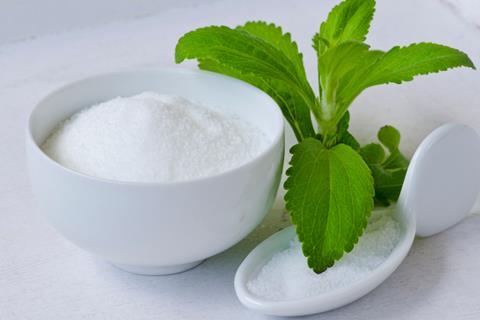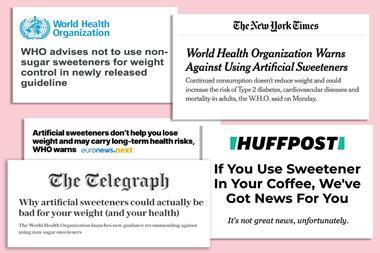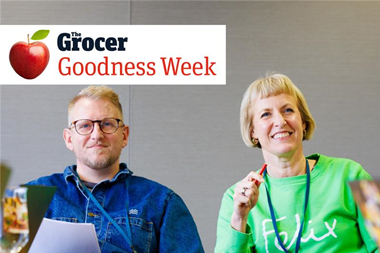
Artificial sweeteners should not be used as part of long-term diets and could contribute to health risks, according to a new report by the World Health Organisation (WHO).
The systematic review by the organisation’s Department of Nutrition and Food Safety claims non-sugar sweeteners (NSS) such as aspartame, stevia and saccharin, which are used across a vast array of products and have been a key weapon used by the industry to slash sugar from products, can themselves increase the risk of problems including Type 2 diabetes and cardiovascular diseases over the long term.
The recommendation confirms draft guidance released last year and suggests non-sugar sweeteners should not be used as a means of achieving weight control or reducing the risk of non-communicable diseases.
However, the WHO conceded further research was needed and stressed its findings were a “conditional recommendation”, meaning they were based on “evidence of low certainty overall”.
The review found that because free sugars are often found in highly processed foods and beverages with undesirable nutritional profiles, replacing free sugars with NSS results meant the overall quality of the diet was largely unaffected.
WHO researchers examined data from 283 studies conducted in adults, children, pregnant women or mixed populations.
“Replacing free sugars in the diet with sources of naturally occurring sweetness, such as fruits, as well as minimally processed unsweetened foods and beverages, will help to improve dietary quality, and should be the preferred alternatives to foods and beverages containing free sugars,” it concluded.
Potential harm
The review follows a 2019 Cochrane Review which concluded there was no evidence for health benefits from NSS, while potential harms could not be excluded.
“Replacing free sugars with NSS does not help with weight control in the long term. People need to consider other ways to reduce free sugars intake, such as consuming food with naturally occurring sugars, like fruit, or unsweetened food and beverages,” said Dr Francesco Branca, WHO director for nutrition and food safety.
“NSS are not essential dietary factors and have no nutritional value. People should reduce the sweetness of the diet altogether, starting early in life, to improve their health.”
However, industry bodies said the admission of the lack of certainty in the report meant it should not stop people buying products containing artificial sweeteners.
The International Sweeteners Association (ISA) said the report failed to recognise low & no-calorie sweeteners’ role in reducing sugar and calorie intake and aiding in weight control.
“Food and beverage companies have reformulated products as part of a comprehensive, global effort to meet public health recommendations (including from the WHO) for sugar reduction,” said ISA chairman Bob Peterson. “Low & no-calorie sweeteners have enabled this innovation and ultimately contribute to the creation of healthier food environments by allowing people to enjoy food and drinks with less sugar and fewer calories, while still meeting their taste preferences.”
The British Soft Drinks Association (BSDA) declined to comment.



















No comments yet